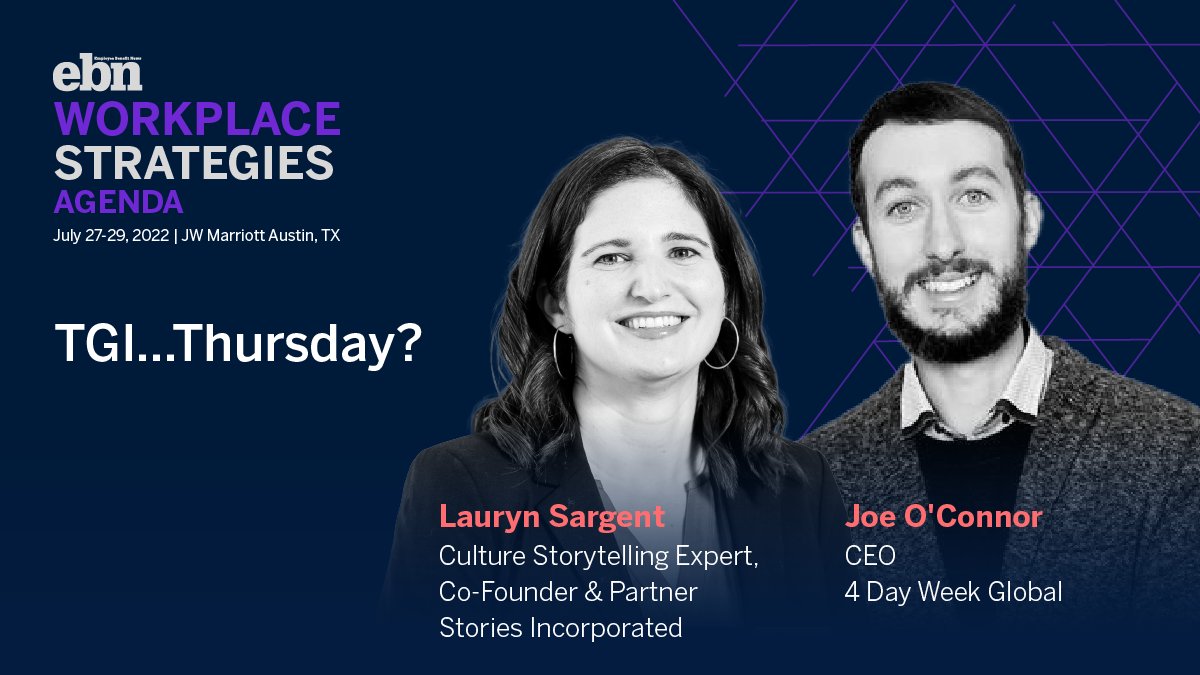Benefits of a Four-Day Work Week: Stories Inc. with 4 Day Week Global
Are you considering implementing a four-day work week? If so, you could make your team very happy:
- 85 percent of U.S. adults approve of moving to a four-day week.
- 78 percent of employees who have transitioned to a four-day week say they are happier and less stressed.
This data comes directly from an organization we are delighted to present with, 4 Day Week Global. Stories Inc. co-founder and partner Lauryn Sargent will join 4 Day Week’s CEO Joe O’Connor on a panel at the Employee Benefit News (EBN) Workplace Strategies Conference in Austin. Their session, titled “TGI…Thursday?”and moderated by EBN’s Deanna Cuadra, will unpack the multiple layers of culture benefits that an abbreviated work week brings. They’ll also discuss how to communicate this progressive benefit to candidates.
Why consider a 4-day week?
4 Day Week Global’s extensive research reveals that when companies implement a four-day week, without any reduction in pay for employees who formerly worked five-day weeks, the benefits are great:
- Employees report lower stress is lowered and increased work life balance.
- Employee engagement increased as much as 40 percent.
- Team engagement levels increased in key areas of commitment, empowerment leadership, and stimulation.
- Client reporting of staff errors decreased and customer satisfaction increased.
- After announcements of flexible work initiatives, Fortune 500 companies’ stock prices rise.
Stories Inc. has seen first hand the benefits of implementing a four-day work week.
How can a company implement it?
Stories Incorporated’s co-founders started with Summer Fridays in 2018. After literally no changes to productivity and client satisfaction scores, but an increase in employee satisfaction and decrease in their team’s stress levels, Stories Inc. rolled out half-day WFH Fridays/every other Fridays throughout the entire year. And in May 2020, at the height of the pandemic, Stories Inc.’s partners announced that the company would be officially adopting a year-round Monday-Thursday work week schedule.
In essence, the Stories Inc. leadership led a gradual transition and trial to arrive at the company’s current Monday-Thursday work week schedule.
However, there’s now a formal plan available to interested organizations. Currently, Joe is leading the coordination of 4 Day Week Global’s pilot program, which provides companies with a coordinated six-month trial of a four-day week without any loss in pay for employees. In partnership with researchers at Cambridge, Oxford, Boston College and more, the program works with companies to establish productivity and success metrics. These metrics will be monitored throughout the trial, with an impact assessment provided at the end of the trial. The pilot program also includes training, mentoring and networking for a smooth and rewarding trial.
The United States, Canada, United Kingdom, Ireland, Australia and New Zealand are the first regions where the pilot program is being offered, but new programs are launching every quarter in different regions. As of now, 150 companies and more than 10,000 employees are participating.
Forward-thinking impact of a 4-day week
Since Stories Inc. announced our four-day week, we haven’t looked back! Our retention is high, our ability to recruit and compete has been enhanced, and team members regularly comment about its impact.
According to 4 Day Week Global, company leaders implementing four-day weeks often try it to offer employees greater well-being, and in the process, reduce turnover and compete for talent on a whole new level. In fact, their data shows that 63 percent of companies found it easier to attract new talent after adopting a four-day week.
How to promote innovative programs like this to candidates
While gaining popularity, a four-day work week is still rare. Like most programs that are unique to your culture, it’s important to promote it to candidates so you can take advantage of what makes you stand out from other employers. Stories Inc. works with organizations to use employee stories to communicate innovating employee programs and unique corporate cultures.
Once you have your program in place, it’s time to uncover stories from those leading and benefitting from that change.
Here’s an example. The Motley Fool has an innovative program in place called Fool’s Errand. If your name is drawn, you must take a two-week break from the office!
If you’re attending Workplace Strategies, we hope to see you at our session!
For more culture content ideas, get our guide to the top 10 stories that appeal to candidates today.


